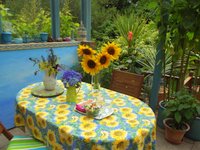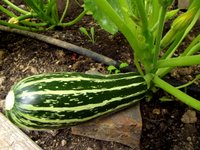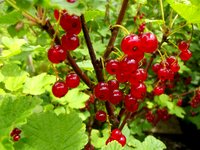 In NGS National Gardens and Health Week, it seems appropriate to survey what we now know about how gardening and access to green spaces, impacts on our well being. Much of what is “discovered” in scientific research into this topic, will come as no surprise to keen gardeners or those who know them.
In NGS National Gardens and Health Week, it seems appropriate to survey what we now know about how gardening and access to green spaces, impacts on our well being. Much of what is “discovered” in scientific research into this topic, will come as no surprise to keen gardeners or those who know them.
 In the UK, 87% of households have a garden, and half the adult population in England report gardening as a free time activity: homing in on age ranges, this figure is 40% in the 25-44 age group and 70% for those aged 65-74. Increasing numbers of younger adults would like to grow food. As an indicator of the direction in which gardeners’ interests overall are moving, sales of vegetable seeds have recently exceeded those of flower seeds for the first time since the Second World War.
In the UK, 87% of households have a garden, and half the adult population in England report gardening as a free time activity: homing in on age ranges, this figure is 40% in the 25-44 age group and 70% for those aged 65-74. Increasing numbers of younger adults would like to grow food. As an indicator of the direction in which gardeners’ interests overall are moving, sales of vegetable seeds have recently exceeded those of flower seeds for the first time since the Second World War.
 It has been established that time spent in green spaces is linked to a long-term reduction in reported health problems. This includes heart disease, cancer, musculoskeletal problems, obesity, depression and anxiety. School gardening is linked with a significant increase in fruit and vegetable intake by children. Allotment gardening improves mood and self-esteem, and reduces cortisol levels (a measure of stress) in subjects compared with their matched controls. Studies in Holland, Japan and Canada indicate that for every 10% increase in exposure to green space, people enjoy health equivalent to that of someone five years younger. Living in areas with green spaces is associated with significantly less income-related health inequality.
It has been established that time spent in green spaces is linked to a long-term reduction in reported health problems. This includes heart disease, cancer, musculoskeletal problems, obesity, depression and anxiety. School gardening is linked with a significant increase in fruit and vegetable intake by children. Allotment gardening improves mood and self-esteem, and reduces cortisol levels (a measure of stress) in subjects compared with their matched controls. Studies in Holland, Japan and Canada indicate that for every 10% increase in exposure to green space, people enjoy health equivalent to that of someone five years younger. Living in areas with green spaces is associated with significantly less income-related health inequality.
As we get older, gardening becomes relatively more important as a physical activity. There is emerging evidence of a link with prevention of falls, dementia and cognitive decline.
 The NHS is beginning to use social prescribing and community referral, having recognised that social and economic factors play a role in underpinning health: Lambeth GP Food Co-op covers eleven practices where patients with long-term conditions work together to grow food. Horatio’s Garden creates and maintains gardens in NHS spinal injury centres.
The NHS is beginning to use social prescribing and community referral, having recognised that social and economic factors play a role in underpinning health: Lambeth GP Food Co-op covers eleven practices where patients with long-term conditions work together to grow food. Horatio’s Garden creates and maintains gardens in NHS spinal injury centres.
So in addition to spending time in your own garden, consider visiting others in the south-west which are open this week under the NGS scheme
(Gardens and health: Implications for policy and practice. The King’s Fund, May 2016.)
